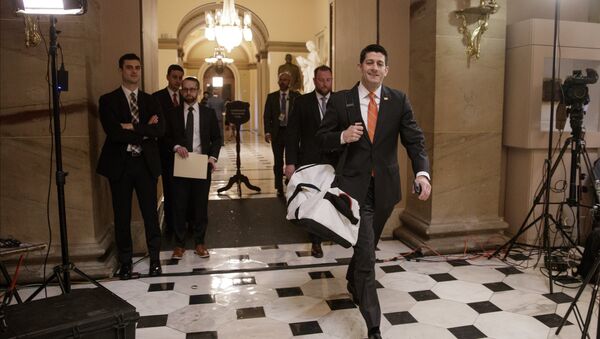The GOP bill has gotten pushback from three sides: Democrats, the House Freedom Caucus, and right-leaning groups such as the Heritage Action Foundation and Club for Growth. At least 32 members of the Republican party voting with the Freedom Caucus vowed to vote no, the Hill reported.
Paul Ryan could only afford 22 'no' votes for the bill to pass, so the delay may be an acknowledgment that right now President Donald Trump and Speaker Ryan haven't whipped enough votes to pass the first chamber of the legislature.
A Congressional Budget Office report estimated that the AHCA would strip access to medical providers for 24 million people, which would effectively wipe out the gains in coverage made by the Affordable Care Act, a law that boosted coverage for at least 20 million Americans.
The president's first 100 days in office are often considered by analysts, pundits and historians as the most significant during a presidential term. Thus, while Trump wanted to pass the AHCA so he could move on to other campaign promises like tax reform, his legislative agenda has suffered a massive setback.

It's worth noting that while the ACA took more than a year to schedule public hearings, include feedback from advocacy groups, and add over 70 amendments based on public commentary, the GOP attempted to rush this bill through in a matter of months. What's more, the bill's chances look even worse in the Senate, where numerous Republican senators including Sen. Rand Paul have stated that based on the bill's language it would be dead on arrival.
The House vote has been rescheduled for Friday morning, a White House official said. US officials in the White House worried that if the vote weren't postponed it would have taken place around midnight, presumably due to the fact that negotiations of what will be included and left out of the bill are still ongoing.
The delay was motivated by "for scheduling" purposes, White House spokeswoman Sarah Huckabee Sanders said. "So no one has to be up at 3 a.m."
If negotiations continue the rest of Thursday and into Friday morning, that would mean that many of the lawmakers voting on the bill will not have read the full text of the AHCA by the time of the vote.
Proponents of the bill argue that House Freedom Caucus members should fall into line and vote for the AHCA, because for years, the standard GOP talking point has been that if the Republicans controlled the House, Senate, and the presidency, the Republican party would overturn Obamacare by repealing and replacing it. The way to do this, called 'budget reconciliation,' was supposed to be one of the easiest parts of 'repeal and replace,' since it only would require a simple majority to pass the Senate instead of the usual 60 votes required for this kind of bill.
On Thursday, White House Press Secretary Sean Spicer said the AHCA "is plan A and plan A," adding that there is no plan B.
The AHCA includes provisions such as "a $350 billion cut to Medicare," and "they’re also taking away funding from Medicaid," Dr. Margaret Flowers, a pediatrician, told Brian Becker during a recent episode of Loud & Clear on Radio Sputnik.
Trump has repeatedly told crowds that "Obamacare is a disaster." But as Becker pointed out, "A large number of Kentuckians are now receiving healthcare because of expanded Medicaid," a state Trump won where people who voted for him may lose insurance coverage.
But eliminating Medicaid funds to vulnerable populations, the bill threatens patient access to treatment for opioid, drug, and alcohol issues. "We have been able to take Medicaid (as a payment form) for drug and alcohol treatment," Tim Robinson, CEO of Addiction Recovery Care in Kentucky, said on Loud & Clear.



